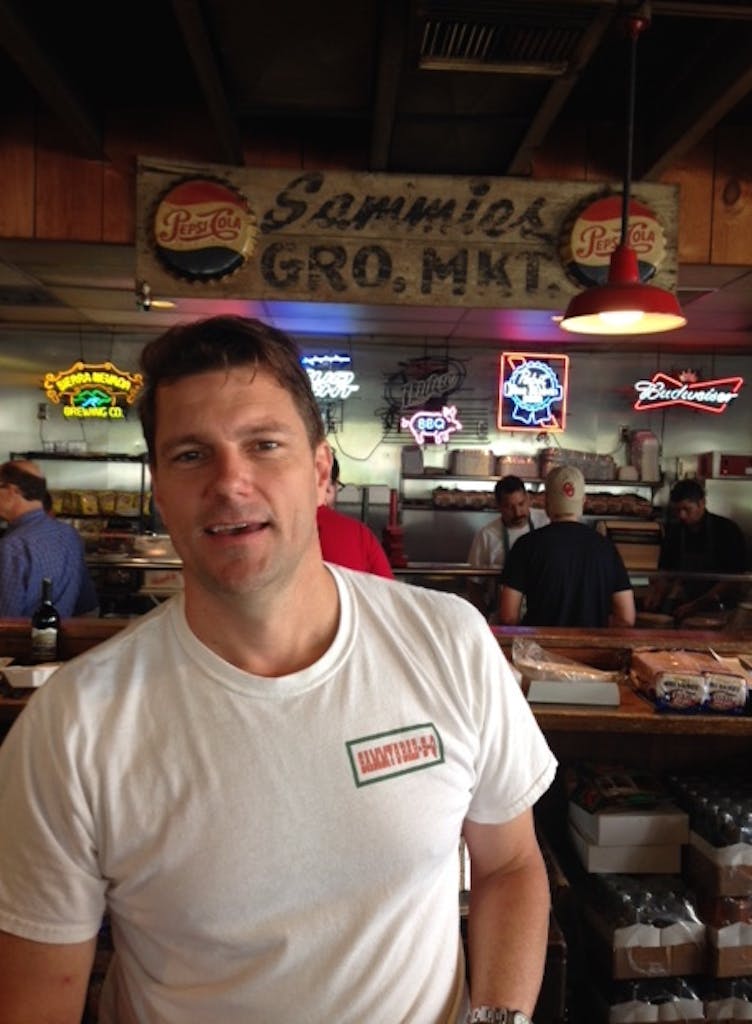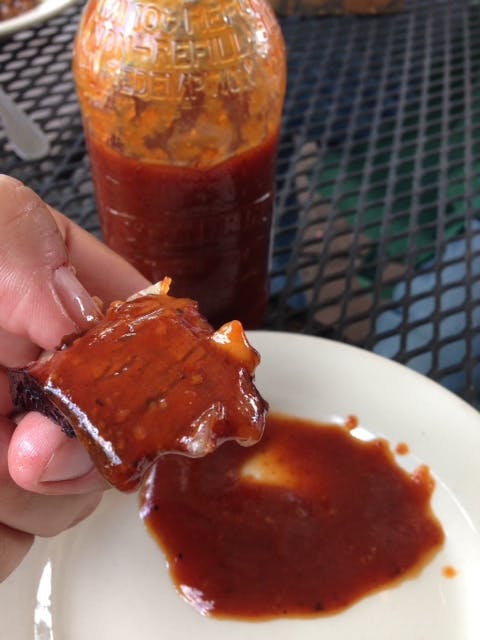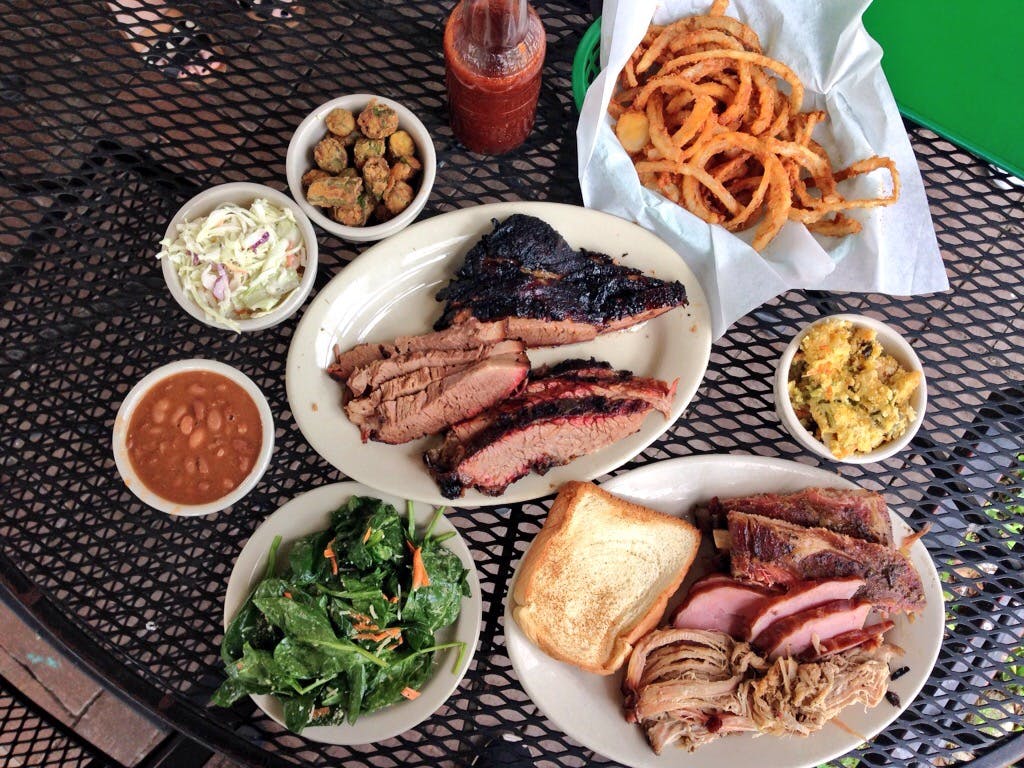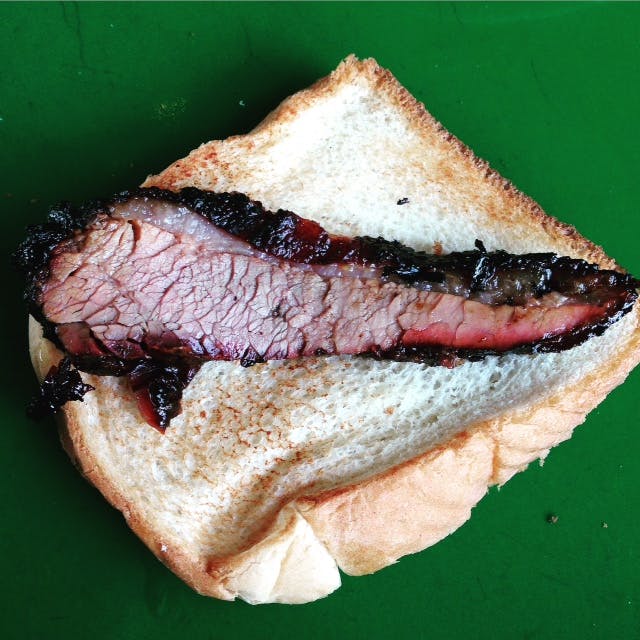 Owner/Pitmaster: Sammy’s BBQ; Opened 1992
Owner/Pitmaster: Sammy’s BBQ; Opened 1992
Age: 45
Smoker: Wood-Fired Rotisserie
Wood: Hickory
Marshall Prichard could pass for a decade younger than his forty-five years. Somehow the barbecue business has been kind to him in the aging process. He was there on day one when Sammy’s BBQ opened in 1992, and he still brings a youthful exuberance into work every day.
When Sammy’s first opened, the neighborhood around them that would soon be called Uptown was still a shell. Empty houses and no investment made it a less than coveted spot for a new business. Now Sammy’s is surrounded by town homes and office buildings. Ties and slacks adorn most of the lunchtime patrons.
The barbecue world is in transition. Consistency is praised, and great brisket is worshipped. Sammy’s has never been known as a joint with stellar beef, but Prichard is changing all of that. The business may have lots of history, but he’s not afraid to change a few recipes. Just not grandma’s pecan pie.
Daniel Vaughn: Who does the cooking here at Sammy’s?
Marshall Prichard: I still do. Everything is homemade here. That’s rare these days. I used to do everything, but I needed some help in the kitchen.
DV: You said you worked on the block when this place first opened. Did you leave to pursue your own career before coming back to Sammy’s?
MP: My dad was in film distribution. I hooked into a deal with a guy with a big producer. We shot a movie called Enemy at the Gates when I was out there, but in the movie business they’re just waiting to screw you. I ended up living out there for ten years then came back. I gravitated back to the barbecue. It ended up being a lot bigger of a thing than we thought.
DV: When did you come back from LA?
MP: In 2001, when I was about thirty.
DV: Did you get right back into it?
MP: I did, and I’m still on the block. When you’ve got 125 hungry people waiting…I learned it helps to slow down a touch for self-preservation.
DV: You need to have a sharp knife.
MP: That’s right. That knife will hop all over if it’s not. We do the chopping block deal because of Peggy Sue BBQ. That’s where I would go as a kid and get two chopped beef sandwiches, and they’d chop it in front of you.
DV: In Snider Plaza? I’ve never seen a chopping block on display there.
MP: They had a line back in the day. It was all back down on the left side. Some places would give you the sloppy joe thing, but not there. We stole dishes from all of our favorite places back then. I liked the rings from Chip’s. Sonny’s was the sauce bottles. We used to buy this beef sausage from a little place about forty-five minutes outside of Austin.
DV: Was it Southside in Elgin?
MP: It might have been Elgin. It was a little red building. The guy died and his kids were running it.
DV: That sounds like Crosstown BBQ.
MP: I think that was it. He was doing it with a hand grinder.
DV: Do you grind any sausage here?
MP: I have but…
DV: The Packing House is pretty cheap, right?
MP: The Packing House is cheap. It’s funny. For a long time they wouldn’t deliver north of Northwest Highway.
DV: They don’t have another food vendor deliver for them?
MP: No. They do it themselves. The owner used to do it. They say he was the craziest guy on that part of town. If you tried to nab something off the shelf, he would come out there with a bat. His name was Cliff. All they did was sell a ton of brisket, a ton of Carolina turkey, and Smokey Denmark’s sausage. My hat’s off to anyone who can make a consistent good sausage. It’s hard and it’s time consuming. Then, when you’ve got the perfect deal, you’ve got to figure out where you went right all along the way. For me, making sausage was just making something easy, something hard. It wasn’t that I was copping out to it, but there’s so much good German sausage to buy.
DV: Where did that sauce recipe come from?
MP: My grandmother. From my understanding, in 1950 the Times Herald published Sonny Bryan’s original recipe. That recipe disappeared, but my grandmother added some cayenne and brown sugar. We put the brisket trimmings in there too.
DV: You mentioned Peggy Sue BBQ. Were there other barbecue spots in Dallas that you ate at when you were growing up?
MP: Roscoe’s Easy Way was at Lovers and the Tollway. It was the first place I had ribs. Roscoe White was an old school guy, like a legend. Sammy Lobello was in Preston Center. They were the kinda down and greasy style of barbecue in that part of town. People didn’t call it The Easy Way, they called it The Greasy Way. I remember sitting with my dad, at Easy Way eating ribs. I was probably five or six. I’d grab them and just eat the sides of the ribs. My dad goes “You’re eating those ribs wrong.” And I said “Well, they sure taste good.” He’d pick up my bones and eat the rest of them. Those were my first two memories in barbecue.
DV: Do you still eat other people’s barbecue?
MP: I will if it’s around. People are always trying to ask me “What do you think about this guy or that guy?” I’ll say “Does he wear an apron? Does he serve to the public? Well, then my hat’s off to him because y’all are difficult.” After being here six days a week, I can barely sneak away for a burger.
DV: You aren’t known as one of those places that opens up then closes when they sell out, but you basically have those hours. 11-3 Monday through Saturday.
MP: Yes. We try not to run out, but you want a fresh product. The best excuse to your customer is that you’re trying to preserve the integrity of your meat. You don’t want some brisket brick that has been sitting there for three days.
DV: You had a beef rib on the menu, but I don’t see it anymore.
MP: I was losing money on that beef rib. It’s hard to screw those things up. I’ve taken them off the bone and done them like a high heat strip, you know, Brazilian style. If you do something like that between three or four guys, you all get a few bites, but it’s so rich you don’t need much more. People would end up getting one for the table. You see a guy taking a photo the same day, and that’s all I wanted right there.
DV: What’s the best selling item on the menu?
MP: The brisket and sausage plate is probably the most popular. I get construction guys who come in get rib plates. A three meat plate is $12.95, and it’s basically a pound of meat. I tell the guys who order a pound of meat just to get a three meat plate and the veggies come free.
DV: Always looking out for the customer.
MP: I don’t ever want to feel like I’m taking advantage of something or gouging someone. My grandfather would sit in here and tell me “If you went up a nickel on everything, you’ve had a whole lot of nickels at the end of the day.” But nah. I do wonder how the percentage of closing barbecue restaurants compares to other restaurants.
DV: And the age of the ones closing. It is older joints or new ones? Part of the reason I wonder is looking at your prices versus the newer joints. If they open and sell brisket for $16/lb then nobody bats and eye, but your customers certainly would if you raised your prices to match.
MP: That’s what Harry, a guy who used to work for me would say. But for me, you don’t want to feel like you’re gouging anyone. You want to give them a good product at a fair price and keep them coming back. I feel like these new hip places aren’t about getting people to come back.
DV: To get a sustained fan base…
MP: I don’t know. For some of these places, is it sustainable? I’ve always told people that in Dallas if you can’t make it in burgers, barbecue, or Mexican food, you better get out of the restaurant business.
DV: The thing I love about this place is how much of the effort is visible. There’s homemade sauce and it’s kept warm. You serve root beer in a chilled mug. The onion rings go in the fryer when they’re ordered. Everything else is homemade.
MP: The pickles do come from five gallon buckets.
DV: Until today, the one thing that was lacking was good brisket. That’s not the case today.
MP: What they used to do is the guys would get so nervous about running out of food, they’d cook so much. When when they got to trimming it they would take all the fat off. You can still preserve the integrity of the meat and have it lean on the plate. I tried to educate the customer a touch when I started leaving some fat on there. I would say “Look, you can cut it off with your fork, but that piece of meat will be better for having that on there than if I trimmed it off. Even the guys who get the moist cut, they don’t eat all the fat. Even if you like ribeyes, you don’t eat all the fat on them. Then we switched from trimming it after cooking to pre-trimming it.
DV: Have you always cooked with the J&R smokers?
MP: No. We got an old pit from a guy out of Fort Worth. It’s a five rack rotisserie. I got the J&R pit for Preston Center when we had it open. I keep it for a backup.
DV: How many years did the Preston Center operation run?
MP: Five years. The rent just skyrocketed.
DV: What year did the original open here?
MP: My dad starting working on it in 1991, and I think we opened in 1992.
DV: Was it an active grocery store when you took over?
MP: Yeah. It used to service State Thomas. We bought the place. It was Sammy’s Grocery store, so we just kept the signs and it all kinda worked out. It was me on the block, my older sister on the vegetables, my middle sister on the register, and mom and aunt in the kitchen. A lot of my dad’s buddies were helpful in getting it going.
DV: Was the old grocery store black owned?
MP: Italian owned, and the son of the owner was half black and half Italian. He worked for us for five years after we opened. His named was Junior “Six Toe” Rivera. He knew everybody in the neighborhood. One day a guy came in and said “Do you know why they call him Six Toe?” I said “No.” And he said “Because he’s got six toes!” I never got visual confirmation. His mother worked for the owner, and they had and affair. That’s where we got all the old Sammy’s signs.
DV: The one I saw was spelled Sammie’s.
MP: They were all spelled different, so we went with Sammy’s. Our original investors, for like the first two weeks, were the guys who started Mi Cocina. They were looking for something like jets and Jacuzzis, you know money from the first day. We got them worked out of the deal. The next weekend we got a write-up in the New York Times. I think they liked to see a full family working here. People ask me if this place is mine, and I tell them it’s just my fault. It’s mine if something goes wrong. If everything’s going right, it’s mom’s.
DV: This area was once the Freedmen’s Town. They struggled to get paved roads and electricity, so it’s amazing to see the transformation of the neighborhood, but it’s also crazy to see how much has changed just since you opened in 1992.
MP: When we got here, we were it. The Crescent had been built ten years earlier. The Fed had just been built. This was all fields. I could have hit a driver off the front porch here. It was just dinky houses. It was disappointing to me in the beginning to see all the change, but in the past three years with the new [Klyde Warren] park and the Arts District, it’s finally a bit more of a walking town.
DV: What was the neighborhood called back then?
MP: It was State Thomas, but they called it the Thicket. My cousin worked at 8.0’s. He was a bar back, and one of the guys he worked with, he would take him home. He’d make him stop at Thomas and not drive into the ‘hood. He’d tell him “Drop me off here so you can give me a ride tomorrow.” It happened quick. There’s very few houses in there anymore.
DV: Was it a change for the better for your business?
MP: I think we’ve done a little better every year than the last year. I thought the parking was gonna hurt us, then we started doing more catering and more parties. When my dad owned the block you could park all the way up to the freeway.
DV: Do you know how much your dad paid for the block?
MP: I don’t want to cry. I don’t have an exact number.
DV: You don’t own it anymore?
MP: No. He sold it to the Fed ten years ago and got a lease back. The property taxes were getting crazy.
DV: Do you get a lot of business from the Fed?
MP: A little, but mostly every two weeks on payday.
DV: Do you still eat barbecue for a meal?
MP: I eat barbecue every day, but not for a meal. I go around a sample everything. I usually pick one thing and get it right. Right now it’s the slaw, but I’m not really a slaw guy. It’s always something, but by the time you get around the menu, you’re back to the first thing. I try to teach these guys. A lot of them now have the passion for it, but some of them have two jobs. They’re here for a job. I try to explain that every cow had a different life. Watch the meat instead of your watch.
DV: Do you wrap your briskets during the cooking?
MP: I wrap them after they come off. They go into a warmer. We used to plastic wrap them, but I felt that was a steaming method. Now we wrap it in butcher paper. It keeps the texture better on the outside of the brisket. Everybody does it a different way, but the worst barbecue I’ve had was still pretty good. I’m glad there’s more barbecue. I love seeing barbecue on the west coast and seeing it grow out there.
DV: Did you ever find any good barbecue out there?
MP: Not really. I had a guy take me to Noonan’s in Beverly Hills. At the end of the line, they give you a fortune cookie. A fortune cookie?!?!
DV: When you got back from LA, did you feel like you were forced back into the family business? How did you get to the point where you were truly passionate about it?
MP: I wasn’t as grateful as I am now. Being in your forties just makes you more appreciative. I’ve always been a people person. Then I got into the food. The guy that had a restaurant behind me in Preston Center, James Neal, he’d be on me every day. “You gotta do this or that.” I had this case of red wine that I didn’t like, so I cook it with celery, onion, carrots, and garlic, then let the briskets sit in there for two days. We call it borracho brisket.
DV: When do you cook this?
MP: Every Friday. We just do three of them. It sells out fast. People love it.
DV: Brisket marinated in red wine?
MP: We do everything like a regular brisket, but it’s marinated for two days. The texture’s the same. You get a little of the red wine at the front, and at then end. That’s about as much lipstick as I was willing to put on that pig. Barbecue is a working man’s deal. I love that’s it hip now, but it’s always gonna be for the working man.
DV: Are you still having fun with it?
MP: I am. I don’t know if I could do it without my family. The restaurant business is a tough business. It’s not like Rick from Casablanca. It’s not “Hit it Sam and give me a scotch.” It’s more like “Jose didn’t show up, and the bathrooms are flooded.”











